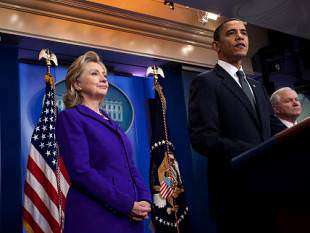Is Hillary Clinton the HealthCare.gov of Presidential Candidates?
Why Hillary Clinton's inevitability could be a big weakness in 2016.

For a sense of how crowded and chaotic the potential Republican presidential field is, it's worth reading Sean Trende's RealClearPolitics analysis of the coming race, "What If No One Wins the GOP Presidential Nomination?"
Trende makes a compelling argument—complete with a simple but smartly devised scoring system—that the Republican candidate pool is deeper and stronger than at any time in recent history, based mostly on fundamentals like offices held and elections won.
With a field this deep and this strong, Trende argues, two things are likely: the first is that some candidates who seem like strong candidates will significantly underperform; the second is that no candidate will break away with a clear lead coming out of the primaries.
What that means is that a brokered convention, where no candidate has locked up the nomination based on primary voting, is a real possibility. Indeed, Trende says "it might well be the most likely outcome, if only because no particular outcome is particularly probable."
The Republican primary contest, in other words, is at this point utterly, fascinatingly unpredictable.
The Democratic contest, on the other hand, is set to be boringly, perfectly predictable. Hillary Clinton will run and win the nomination.
It's possible she will never face off against a challenger. It now appears likely that she will run either unopposed or effectively unopposed. As Politico's Mike Allen reported earlier this week, "the potential opposition is so weak that Clinton might wind up not even debating during the primaries."
It won't be a competition. It will be a coronation.
Indeed, in a follow-up today, Allen reports that Clinton is considering delaying the launch of her campaign from April, as reportedly planned, into the middle of the summer, likely July. The reason for the delay is that she expects to face no serious challenge for the nomination. According to one anonymous adviser who spoke to Allen, "She doesn't want to feel pressured by the press to do something before she's ready. She's better off as a non-candidate. Why not wait?"
Think about that one for a moment: She's better off as a non-candidate. That's not exactly a stirring testament to her strengths as a politician, especially given her flop of a book launch and the general timidity with which she's conducted her shadow campaign so far.
But it does suggest a looming potential problem for Clinton and the Democratic ticket in 2016: She won't be challenged before the general election.
In contrast, the Republican nominee will have run a brutal primary gauntlet.
That doesn't mean that Republicans will nominate the best possible candidate, or even a very good one. But it does mean that the Republican candidate will been proven to some extent through user testing. Now, as software developers everywhere will tell you, successful user testing on a small scale in-house can still flop on launch day. But some testing is better than no testing. Hillary Clinton may well be launching with none. She'll be the HealthCare.gov of candidates.
Right now, Clinton has a commanding lead in the polls over every likely GOP opponent. Polls this early don't tell us much of anything about likely election outcomes, but they do suggest that Clinton starts from the presumption of strength. People assume she's a strong candidate, and that comes with certain benefits—in particular, a lock on party resources. But the lack of a primary challenge means that will remain an unproven assumption.
Indeed, Clinton's inevitability could prove to be a weakness for Democrats in 2016. Her dominance, combined with the limits imposed by her connections with the current administration, will make it harder for her campaign to respond to events flexibly and, in the process, will make her vulnerable to an unpredictable upstart challenger in the general election.
The unusually uncertain state of the Republican field makes this an even bigger potential weakness. Whether she launches in April or July, Clinton won't know who is going to win, or what kind of campaign the winner will have run—and therefore won't know how to design a campaign that specifically counters her general election opponent. Republicans, in contrast, will have spent roughly a year testing various approaches that might prove effective against Clinton.
The GOP's wide-open primary race gives the party an opportunity not only to win but to experiment and change. For those of us who are consistently disappointed with or frustrated by the party's candidates, that should at the very least be intriguing, and perhaps even provide a smidgen of hope. Democrats, on the other hand, are for all practical purposes stuck with a single option, one that won't truly be tested until it's too late to change.


Show Comments (325)